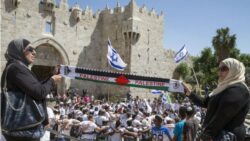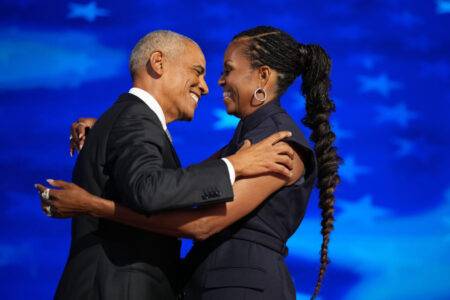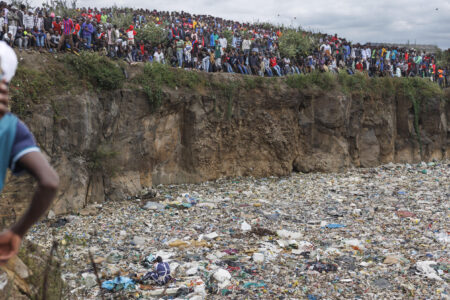Violence has erupted across the Middle East since Donald Trump’s recognition of Jerusalem as Israel’s capital and now US embassies in the region are braced for a third day of protests.
There are increased fears over the security of American diplomatic staff and their families in case angry protestors target US interests after Friday prayers. Israel has already been forced to deploy extra security forces in anticipation of more clashes in Jerusalem and the occupied West Bank.
Tensions heightened after Hezbollah’s secretary general, Hassan Nasrallah, called for a third Palestinian Intifada just hours after Hamas urged the same.
Since Trump’s announcement on Wednesday, the most violent confrontations erupted in Ramallah, Bethlehem and Hebron between protestors and Israeli forces. The occupation army fired teargas and rubber bullets as hundreds of Palestinians threw stones and set fire to barricades.
In Gaza more protesters rallied at the Erez border crossing with Israel and clashed with Israeli forces. Two missiles were reportedly launched from Gaza on Thursday falling short of targets in Israel but triggering alarm systems. In neighbouring Jordan American flags and posters of Trump were set on fire by demonstrators who gathered near the US embassy in Amman.
It has now emerged that all 28 EU foreign ministers had warned Trump’s Secretary of State Rex Tillerson against moving the US embassy in Tel Aviv to Jerusalem in a meeting the day before the US president made the announcement, the European Commission has said.

Speaking at a press conference on Thursday in Brussels Federica Mogherini, the EU’s high representative for foreign affairs, predicted the potential for “even darker times than the ones we are already living in”. She added: “I discussed this with Secretary Tillerson during his visit to Brussels on Tuesday. I’ve made clear our disagreement with this decision as did all the foreign ministers of the 28 member states of the European Union that met him with me the same day.”
The UN security council will now meet today (Friday) to discuss Trump’s announcement in response to a call from eight countries on the 15-member council. Those gathering include Britain, France and Italy amid claims from Palestine that Trump’s recognition statement was in breach of international law and UN resolutions.
Meanwhile international condemnation continues to mount across both the Arab world and the West and was initially led by the Turkish leader Recep Tayyip Erdoğan. The EU foreign policy chief, Federica Mogherini, said the EU’s position was unanimous and that Jerusalem must be the capital of both Israel and a future Palestinian state.
France has already rejected the “unilateral” US decision, while in Britain both the UK prime minister, Theresa May, and the foreign secretary, Boris Johnson, have described Wednesday’s announcement from the White House by Trump as “unhelpful”.
The Russian foreign ministry said US recognition risked “dangerous and uncontrollable consequences”.
It appears that Trump’s declaration has pleased no one apart from Israeli Prime Minister Benjamin Netanyahu who hailed the US move as “historic” and claimed other countries were in contact about following Trump’s lead. However, as yet, Israel remains isolated in its ambitions to declare Jerusalem as its capital.
Saudi Arabia’s royal court called it “unjustified and irresponsible”, in a rare rebuke of the US, and Turkey’s president, Recep Tayyip Erdoğan, said Trump had thrown the Middle East into a “ring of fire”.
Thursday’s confrontations on the West Bank took place during a widely observed general strike that closed Palestinian shops and schools. The presence of Palestinian police in plain clothes and armed security forces in uniform nearby suggested a degree of control by the Palestinian president, Mahmoud Abbas.
The scale of the protests and level of violence noticeably fell short of similar clashes at the height of the second intifada.
At one large confrontation in Ramallah, a group of three teenage girls, their faces masked with headscarves, told reporters: “Trump can go to hell.”

In Jerusalem’s Old City, where most Palestinian shops were shut, Salah Zuhikeh, 55, told Agence France-Presse (AFP): “By this decision, America became a very small country, like any small country in the world, like Micronesia. America was a great country for us and everyone.”
Trump defied overwhelming global opposition by recognising Jerusalem as the capital of Israel on Wednesday and directing the state department to start making arrangements to move the US embassy from Tel Aviv.
“While previous presidents have made this a major campaign promise, they failed to deliver. Today, I am delivering,” he said in a short speech at the White House. “My announcement today marks the beginning of a new approach to the conflict between Israel and the Palestinians.”
‘It is time to officially recognise Jerusalem as the capital of Israel,’ says Trump in the video and it later emerged, in a memo leaked to Reuters news agency, that the US had privately asked Israel to temper its response to the announcement.
The state department document, dated 6 December, stated in talking points for diplomats at the US embassy in Tel Aviv to convey to Israeli officials: “While I recognise that you will publicly welcome this news, I ask that you restrain your official response.”
It continued: “We expect there to be resistance to this news in the Middle East and around the world. We are still judging the impact this decision will have on US facilities and personnel overseas.
“You know that this is a unique administration. It makes bold moves. But it is bold moves that are going to be needed if peace efforts are finally going to be successful.”
What will US recognition of Jerusalem mean for the peace process?
Abbas, the Palestinian president, was due to travel to Jordan on Thursday for talks with King Abdullah II, who has come out strongly against the move.
It is significant that Trump recognised the whole of Jerusalem as opposed to the West side.
The US president’s recognition of the holy city as Israel’s capital reveals an administration out of its diplomatic depth.
The United Arab Emirates and Iraq also condemned the decision. In Iraq, a prominent militia backed by Iran, Harakat Hezbollah al-Nujaba, said Trump’s decision could be a “legitimate reason” to attack US forces in the country.
Jerusalem is home to sites holy to the Muslim, Jewish and Christian faiths. Israel deems Jerusalem its eternal and indivisible capital dating to antiquity, and the city’s status is one of the thorniest barriers to a lasting Israeli-Palestinian peace.
Its eastern side was captured by Israel in a 1967 war and annexed in a move not recognised internationally. Palestinians claim East Jerusalem for the capital of a future independent state.
[simple-payment id=”11749″]






